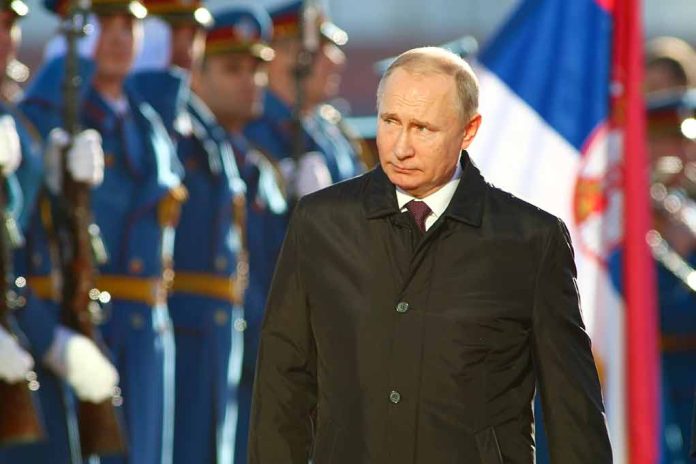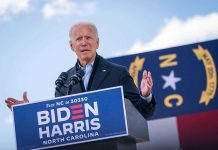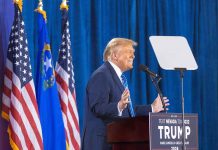
Russian President Vladimir Putin brazenly defies an international arrest warrant by visiting Mongolia, an ICC member state, amid ongoing tensions over the Ukraine conflict.
At a Glance
- Putin visited Mongolia on Sept. 2, his first trip to an ICC member country since the 2023 arrest warrant
- The visit commemorates historical military victories and tests Mongolia’s neutrality
- Mongolia, caught between Russia and China, seeks to maintain independence through “third neighbor” diplomacy
- The ICC lacks enforcement mechanisms, complicating Mongolia’s diplomatic stance
- Ukraine condemned Mongolia for not detaining Putin, accusing it of sharing responsibility for “war crimes”
Putin’s Defiant Visit to Mongolia
In a bold move that has raised eyebrows across the international community, Russian President Vladimir Putin arrived in Mongolia on September 2, 2024. This visit marks the first time Putin has set foot in an International Criminal Court (ICC) member country since the court issued an arrest warrant against him in 2023. The warrant, related to alleged illegal deportations of Ukrainian children following Russia’s invasion in 2022, has been a source of significant controversy and diplomatic tension.
Mongolia, a nation of 3.3 million people strategically positioned between Russia and China, welcomed Putin despite its ICC membership obligations. This warm reception has thrust Mongolia’s delicate geopolitical balancing act into the spotlight, testing its ability to maintain neutrality while fostering relationships with global powers.
Putin Defies ICC Arrest Warrant In Visit To Mongolia, Gets Guard Of Honour On Arrivalhttps://t.co/ZVMjERYlAy
— News18 (@CNNnews18) September 2, 2024
Mongolia’s Diplomatic Tightrope
Mongolia’s decision to host Putin reflects the complex web of historical, economic, and diplomatic ties that bind it to Russia. The visit coincides with several significant anniversaries, including the 85th anniversary of the Battle of Khalkhin Gol, a Soviet-Mongolian military victory in World War II. It also marks the 75th anniversary of Mongolia’s national railway and the fifth anniversary of a Russian-Mongolian strategic partnership.
Vladimir Putin arrived in Mongolia on Sept. 2, the first time the Russian president has visited an International Criminal Court (ICC) member country since the body issued a warrant for his arrest in 2023.
Despite its close ties with Moscow, Mongolia has been pursuing a “third neighbor” policy, seeking to balance its relationships with Russia and China by fostering connections with countries like the United States, Germany, Japan, and South Korea. This strategy aims to preserve Mongolia’s independence and prevent overdependence on its powerful neighbors.
International Reactions and Implications
The international community has closely watched Mongolia’s handling of Putin’s visit. Ukraine swiftly condemned Mongolia for not detaining the Russian leader, accusing it of sharing responsibility for his alleged war crimes. The ICC itself reiterated that all member states are obligated to detain individuals sought by the court, highlighting the tension between international law and geopolitical realities.
“There are no worries, we have a great dialogue with our friends from Mongolia,” Dmitri S. Peskov, the Kremlin’s spokesman, told reporters on Friday, noting that “all aspects of the visit have been thoroughly prepared.”
The Kremlin, for its part, expressed no concern about Putin’s potential arrest during the visit. This confidence underscores the limited practical power of the ICC’s warrant and the complex dynamics of international diplomacy. Meanwhile, protests erupted in Ulaanbaatar, with demonstrators demanding Putin’s departure, reflecting the divided opinions within Mongolia itself.
The Broader Geopolitical Context
Putin’s visit to Mongolia serves as a stark reminder of the challenges facing international justice mechanisms. The ICC’s lack of enforcement power and the geopolitical considerations that often trump legal obligations have been laid bare. For Mongolia, caught between its commitment to international institutions and its need to maintain cordial relations with powerful neighbors, the visit represents a delicate diplomatic balancing act.
As the world grapples with the ongoing conflict in Ukraine and the shifting dynamics of global power, Putin’s defiant trip to Mongolia highlights the complex interplay between international law, national interests, and regional politics. It serves as a testament to the enduring challenges of enforcing global justice in a world still largely governed by realpolitik.





